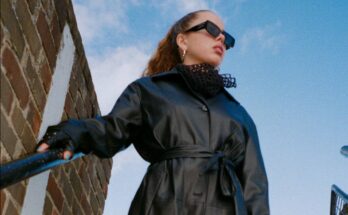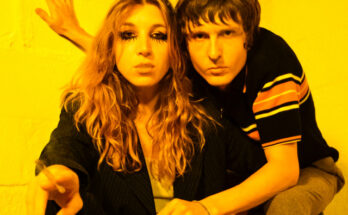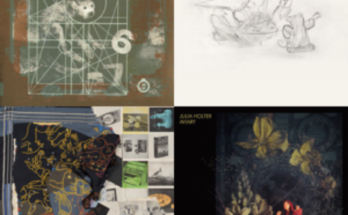Everyone knows the history behind Lollapalooza. Last year’s failure to sell tickets was the first year people asked about the future of the tour. A last-minute push to keep Lolla alive turned the tour into a festival, and with a little political elbow grease, Chicago’s Grant Park became a six-stage, two block gathering, with at least three performers at a time. Lollapalooza 2005 suffered considerable bleed between the two stages located in the large bowl, something Chicago poet Thax (who introduced the Brian Jonestown Massacre’s performance) called “kind of lame.” As it stands, though, bleeding sound was only a small price to pay for the privilege to observe the state of Perry Farrell’s dream nearly 15 years after its inception.
Near the beginning of Saturday’s music, France’s M83 was unable to translate their symphonics to a festival, repeating a lesson Buzz also learned at the previous week’s Intonation Festival: bands that rely upon samples are often left with little to do on stage. The Kaiser Chiefs brought their hooky British charm, and a diminutive Liz Phair dealt with her stage fright – just down the street on the Magnificent Mile, The Gap was using her image to sell chinos.
Buzz caught Dandy Warhols’ guitarist Peter Holstrom checking out the Brian Jonestown Massacre set (opposite Dashboard Confessional): he declared BJM’s feedback attack to be “freakin’ brilliant.” Despite what DiG! may suggest, these guys appreciate each other’s work.
Depending upon who you ask, Cake’s John McCrea is either a tactless idiot or a brilliant satirist. McCrea and band turned out skronky takes on their classic cuts. Billy Idol, in incredible shape despite his considerable years (and probably the oldest performer of the weekend), declared the day fit for a white wedding: at that very moment, the overcast weather gave way to a welcome bout of light rain.
Akron, OH duo The Black Keys suprised the crowd by being young and white, and their modern, unpretentious blues frightened anyone who hadn’t heard them yet. Guitarist/vocalist Dan Auerbach moved like a snake nailed to the microphone, and drummer Patrick Carney completed the band without bass. On the other end of the spectrum, fans were treated to Primus’ only show for 2005, appearing amidst their newest prop – giant rubber duckies.
A victim of poor planning, New York’s Walkmen lost fans of their angular East Coast sound to the gravitational pull of Pixies, who performed simultaneously. It may have been only one of numerous appearances of the influencial band in Chicago since their recent reunion, but that didn’t seem to slow attendance. Eschewing the spacey fare from Bossanova, Pixies favored the shimmery grunge of Doolittle and the tension of their swan song, Trompe Le Monde. Dressed like a school-teacher and holding her cigarette in the middle of her mouth, bassist Kim Deal performed her classic “Gigantic” with both grit and sugar. Midway through, Black Francis switched to acoustic guitar, once resting on the drum riser, and provided fans with the night’s second take on “Wave Of Mutilation.” Pixies have always been gifted with good luck, taste, and timing, and the worst complaint you could lower against them would be to resent Francis’ now-bulging waistline.
Weezer’s Rivers Cuomo drolly introduced rhyhthm guitarist Brian Bell’s “Why Bother?” from sophomore-sleeper “Pinkerton,” an album Cuomo told the crowd “didn’t sell too well”. During “El Scorcho”, Cuomo name-dropped Pixies where Green Day once was. As he sat behind the keyboards for “Buddy Holly”, he resembled no rocker so much as Elvis Costello, even down to the gray suit and receding hairline. The band’s performance was effortless throughout an hour-fifteen of soaring vocals and copious blue stage lighting.
Lollapalooza concertgoers certainly aren’t unified as the attendants to other festivals: there were dancers, hippies, indie kids, punks, heads, and even aging repeat offenders sporting T-shirts from years gone by. Weezer managed to unite nearly 90% of the crowd, who pumped tens of thousands of hands in the air as if to say, “There is one thing which unifies this nation, and it is anonymous white-boy sorrow.” So much so, it seemed to suck energy away from Digable Planets, who couldn’t compete with the star-power of their Lollapalooza hip-hop predecessors.
Those who stepped across the street to the smaller “Planet Stage” during the day were treated to mashups by DJ Muggs (Cypress Hill) and the ever-controversial Z-Trip. Later that night, you could hear San Francisco’s finest CDJ, Mark Farina; his Chi-city buddy Derrick Carter spun house tracks on Sunday. Farina’s unholy mixing came in handy as he steered away from his signature Mushroom Jazz sound, instead speeding up hip-hop tracks (thanks to his digital equipment) for a small crowd of medicated hippies close out the night.
Sunday was cursed by being one of the hottest days of the summer thus far: with water and experience gained from previous festivals, fans and press were able to endure eleven hours of music under extreme heat. The day effortlessly exceeded Saturday in energy, though attendance was down slightly. Responding to the heat, Metro busses had been placed in the park – they idled with AC on full blast for concertgoers. As fans entered, they were greeted by a few masked men on stilts, the only sign of the circus motif that once identified the tour.
OK Go announced to the audience that they thought their new single was so good that fans deserved to hear it as it appears on the album. They weren’t just marketing, though: the be-jacketed quartet made good as they danced and lip-synced as the track was blared over the PA.
Despite some convincing performances by those invited, this year was cursed by a small selection of hip-hop (something which founder Perry Farrell himself decried). Those who turned out early to catch Saul Williams’ set left satisfied as he played to the most diverse crowd to show up that weekend. Unleashing confessional rhymes and delivering spoken word between songs, Saul Stacey Williams is the real deal. Dressed in jeans and a t-shirt, the also-actor incited cheer when he rapped “I know where diamonds come from / ain’t about to bling.” While he performed a song called “Black Stacey” about feeling uncomfortable in one’s own skin, he paused to ask the crowd if they could relate to that (they could), but when he asked “No, really?” many of the majority audience members were silent – he was also joined by Digable’s Butterfly for a powerful verse. Having been to three separate festivals this summer featuring different genres, it’s difficult to deny – rock music and concert-going is largely a sport for white males.
Intense mid-day heat greeted those who attended Dinosaur Jr.’s set. Looking like a warlock with long hair billowing over his face, J. Mascis took the older crowd deep into ear-bleeding country with deeper cuts from their earliest albums, but it was hard to ignore the tension between him and returned-bassist Lou Barlow; all was forgotten when the two worked together for their now famous cover of the Cure’s “Just Like Heaven.”
There was a brief lull as the crowds decided between the cute productions of Canadian identical twins Tegan and Sara and the latest from Farrell himself, the bizarre but tuneful Satellite Party (expect a single soon). Ben Kweller showed himself to be forgettable, as the Drive-By Truckers appeared with three vocalist/guitarists all taking turns on original Southern rock songs.
Despite an appearance from guitarist Eric Krasno of organ trio (plus two) Soulive, who performed earlier that day, G. Love & Special Sauce were unable to draw many from the most buzzed-about band of the weekend, The Arcade Fire. With ten musicians on the stage, including two string players and a “freedom”-hornist, the Arcade Fire were an obscene whirlwind of music. Any free hand in the waistcoated ensemble was soon filled by a drumstick. The band was able to effectively translate the wintery motifs to a Mid-western crowd baked by the sun. Mousey leader Win Butler is as unlikely a frontman as they come, but playing (mostly) bass, crooning from mid-stage and driving Stooges-esque raveups, he created an unmistakable feeling of loss that the Fire has come to represent. Near the end, he took the song (and wireless microphone) into the crowd for a dramatic close. It should suffice to say that if they were to never record another song, Butler would sit at the right hand of Mangum and Curtis in the hearts of adoring fans: farther off, adults could just stare.
Looking angelic in a starched off-white shirt, Spoon’s Britt Daniels was incredibly slick and dangerous, especially when only backed by piano and sharp drums, while Widespread Panic played their first of two sets for the night.
Introduced by the ubiquitous Beatle Bob, The Dandy’s took the stage but had to compete with a band Farrell declared the “hottest group in the country”, the Killers, who obliged a huge crowd with plenty of hits. If Brandon Flowers is Morrissey, guitarist Dave Keuning is Peter Frampton based upon appearances alone.
Death Cab for Cutie played one of the more intimate sets of the weekend. Judging from their current single and the new songs they played, Ben Gibbard seems to have an even more personal sound in store. On the far right stage, guitarist/producer Chris Walla was as exciting and dynamic as high-voiced Gibbard on the far left. As Widespread’s second set and Death Cab’s shoegazing hums faded away, fans began to drift off to bed. A few lingered, however, drawn by a rumor that the Smashing Pumpkins might reunite that night, one nation under a Farrell. Though it didn’t pan out, Lollapalooza seems to have survived the first difficult year in a new format.



